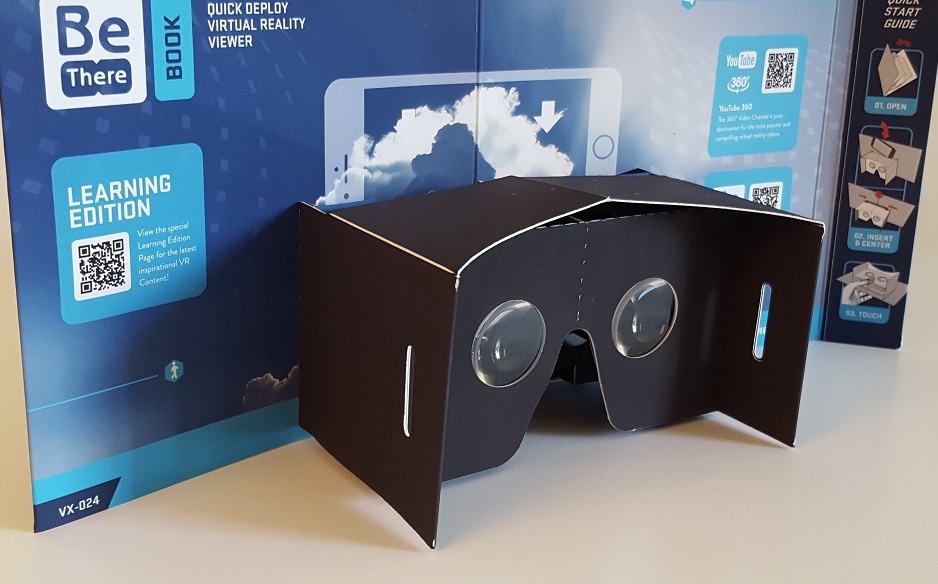A Saudi startup invents VR glasses that could change books for ever

By 2020, the global virtual reality (VR) market is projected to reach $150 billion. It is expected to reach its first billion this year with $700 million.
In the MENA region, the International Data Corporation (IDC) expects the VR market to reach $181.58 million this year, and $6 billion by 2020.
Saudi Arabia is in on the technology. Visual Experience, a startup that was launched in 2014 by King Abdullah University of Science and Technology (KAUST), creates VR experiences in the culture and education sector. They also launched VR glasses called Be There. While similar to Google’s Cardboard, these glasses can be folded and packed inside a book.
From experiences to glasses to B2B services
Visual Experience officially launched in March 2015 as the team realized the potential of VR after Facebook bought Oculus VR for $2 billion.
Mohammed Al-Zaydi, cofounder and COO of Visual Experience, and his brother Abdulwahib, CEO, both had a background in tech and ideas on how to implement VR.
“That is why in 2013, we went to KAUST to participate in their entrepreneurship program,” said cofounder Al-Zaydi.

The company was incubated at KAUST where it received seed funding of $150,000 from the innovation fund. Peter Rautek, a researcher at the university, later joined as a CTO to help come up them with viable products.
In 2014, the team launched ther first product Makkah Window, a VR app showing 360 degree images, videos and interactive maps of cities.

“App users then started asking us for VR glasses, so we decided to develop our business model and start producing glasses made from cardboard following Google’s standards. However, we made them packable and easy to carry,” Mohammed Al-Zaydi says.
They’ve worked on the prototype for eight months and expect to hit the market in November, selling each pair for $26.
“[The cardboard glasses] don’t need to be assembled since they are already built... You can also personalize the designs on the cover which is helpful for companies that want to use these glasses to promote their brand or their events.”
Visual Experience does not only depend on their VR glasses, but they also provide B2B services. So far, Visual Experience developed seven VR apps, and 55 min of 360 degree videos.
“We designed our first VR app for the Mishkat interactive exhibition, organized by the King Abdullah City for Atomic and Renewable Energy in October. We also developed a VR booklet for the exhibition and then developed every detail of the app,” Al-Zaydi says.
Currently, the company is making money from several app development projects for institutions like King Abdullah City for Atomic and Renewable Energy, Sooq Okaz, Makkah Region Development Authority and the Museum of Science and Technology in Islam.

No success ever comes easy
Forbes Middle East magazine ranked the Visual Experience founders among the top 10 most creative entrepreneurs in Saudi Arabia.
KAUST has heavily aided the team with incubation and seed funding, but it hasn’t been able to solve all obstacles they face in the ecosystem.
Many startups work in the VR field for medical, educational or entertainment purposes. Still, it seems that the only thing they have in common is their need for investments to grow.
“[One of the biggest challenges was] finding funding for viable products and sluggish legal procedures,” Al-Zaydi says. “You can easily get a loan, but funding is hard because of the lack of trust in Arab’s technology projects.”

For the company also finds it hard to balance between business development and sales, and managing the revenues from projects and allocating part of it for product development.
The Saudi entrepreneur doesn’t doubt the growth of the VR market in the coming years, and hope his company will go global soon. They are now in talks with Google for a Be There license. “If we get it, we will be one of the 14 companies around the world with licenses from Google for VR glasses; which will strengthen the company’s credibility.”
In this context, and in order to encourage innovative entrepreneurs in new sectors and give them a chance to present their ideas, the Supreme Committee for Delivery and Legacy in Qatar is organizing Challenge 22, an innovation challenge. Those who are interested can register here.


